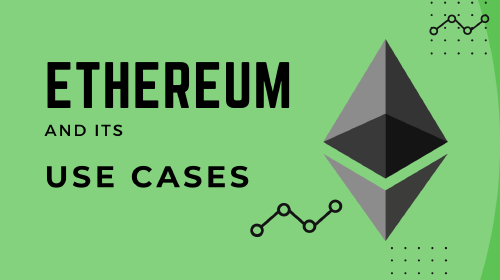Who Runs Ethereum? Understanding Decentralized Governance
Salomon Kisters
Apr 8, 2022This post may contain affiliate links. If you use these links to buy something we may earn a commission. Thanks!
Ethereum is unarguably one of the biggest cryptocurrencies and has many users around the globe. Due to its immense popularity, there are a lot of people who are interested in buying Ethereum.
As an investor, there must be some questions popping up in your mind relevant to the ownership and governance of Ethereum, and we have come up with the answers to all of your questions.
Therefore, before investing your hard-earned money in crypto, it is inevitable to gather as much information as you can as it will play a significant role in finalizing your decision on whether you should go for it or not.
So, without wasting any time, let’s dive straight into it.
What is Ethereum? An Overview
We can define Ethereum as the open blockchain platform. The native cryptocurrency of Ethereum is ETH or ether. Blockchain technology lends a helping hand in making the Ethereum network safer and more secure.
Owing to its security and several other attributes, such as supporting NFTs, Ethereum is one of the best cryptocurrencies. It has secured the second position when it comes to market value. Only one cryptocurrency, Bitcoin, is performing better than Ethereum.
History of Ethereum
Vitalik Buterin was the face behind the introduction of Ethereum. In 2013 he described Ethereum, and it was the outcome of his work in Bitcoin society. After a short period, he published the white paper, and it has information regarding the Ethereum protocol rationale and technical design.
In addition, it describes smart contracts architecture as well. Finally, in January 2014, he formally declared Ethereum in Miami, Florida, USA, at the event of the North America Bitcoin Conference. Vitalik begins working with Dr. Gavin Wood, and they both collectively work on Ethereum.
Dr. Gavin Wood published the Yellow Paper in April 2014, and it works as the technical specification for the making of the EVM or Ethereum Virtual Machine.
By using the specification mentioned in the Yellow Paper, the Ethereum client is implemented in various programming languages, including C++, JavaScript, Java, Python, Go, Rust and Haskell.
In the history of Ethereum, there is a worth mentioning event that took place in 2016, and it led to the development of the Ethereum Classic, ETC.
Many network participants get major control of Ethereum’s blockchain to steal the ether, which had an estimated cost of $50 Million+ and has been collected for the project named DAO.
After that, the Ethereum community decided to revise the history of the blockchain to invalidate the original Ethereum blockchain. By doing this, they want to reverse the hack.
But a small portion of Ethereum didn’t agree, and they opted to go with the unaltered version. So, this original version parted ways from the modified one and named it ETC or Ethereum Classic.
Founders of Ethereum
In this section, we are going to share insights about the people who render their services in the development of Ethereum. So, let’s take a start with the famous Vitalik Buterin.
Vitalik Buterin
It might be quite surprising for most readers that Vitalik Brutein introduced Ethereum when he was merely 19 years old.
We can say that he is passionate about crypto, and this invention is the embodiment of that. After closely examining the Blockchain technology used by Bitcoin, he tried his best to come up with something better than that, and it led to the Ethereum invention.
Buterin used the smart contracts in Ethereum, which can be defined as the small pieces of the self-executing code that is present on the blockchain.
Smart contracts make it prestigious as it is no longer only a ledger of transactions but an impeccable programmable network as well.
As of now, Ethereum hosts a large number of apps and multiple other virtual currencies. In addition to that, Ethereum alternatives have also come into existence, but still, Ethereum is the most powerful.
Early Life of Ethereum Founder
Vitalik Bruterin was among those billionaires who hadn’t even completed their university. He was studying computer science at the University of Waterloo in 2014, but he quit university to work on the development of Ethereum.
Moreover, he was given the Thiel fellowship worth $100,000. Apart from the funding, they also guide along with the resources that aid the young and talented minds in working on their ideas and turning them into reality.
Buterin was born in Russia, but after his sixth birthday, they shifted to Toronto, Canada. Owing to his immaculate skills in programming and maths, he managed to get admission to a school dedicated to gifted children.
At the start of his journey, he started writing for a blog on Bitcoin in order to earn renowned crypto. After a short time, he, along with Mihai Alisie, co-founded Bitcoin Magazine. It is important to mention here that Mihai Alisie is also the co-founder of Ethereum.
You must be wondering what the driving force that motivates and inspires Buterin to work for the invention of Ethereum is.
According to Buterin, it was the Warcraft trauma in the year 2010 that became the main source of motivation for him. Buterin said that the one-day warlock spell of damage component was removed by the game developers.
It made him think about the drawbacks of a centralized service, and he plans to dedicate his time and energy to the development of a decentralized system.
Co-founders of the Ethereum
Vitalik Buterin didn’t develop Ethereum solely; rather, there are a bunch of other co-workers who assisted him in making Ethereum a reality.
There were a total of eight co-founders of Ethereum, but as per The Block, Buterin regrets this decision later on. Some of the co-founders left the Ethereum project in order to create their own crypto, for instance, Charles Hoskinson, Gavin Wood, etc.
Among all these co-founders, Buterin is the only one that is still associated with it and working on it.
Buterin - Member of Executive Board of the Ethereum Foundation
Buterin is also the Ethereum foundation executive board member.
The Ethereum Foundation is involved in governing the development of Ethereum.
In addition, it plays the role of controlling the treasury and has a key role in involving the community.
Who actually runs Ethereum?
As we know that Ethereum has a decentralized blockchain, so there is not a person who is involved in either controlling or running the Ethereum protocol. But when it comes to the implementation of the changes, there is a need for decision making.
In the decentralized system, conventional organizational governance is not appropriate. Therefore decentralized governance has been introduced, which is a procedure that involves the making of protocol changes.
There are two types of decentralized governance. One is on-chain, and the other is off-chain.
We are discussing Ethereum here, so it is significant to mention here that it works on the off-chain governance; therefore, plenty of stakeholders play their role in this process.
In on-chain governance, the protocol changes are usually decided with the help of the stakeholder vote and commonly by the governance token holders, and as far as voting is concerned, it takes place on the blockchain.
On the other hand, in the case of off-chain governance, the decision of protocol amendments is taken place by an informal procedure that particularly involves social discussion. So, if it is approved, then it will be implemented in code.
In this process of governance, there is an extensive range of stakeholders, and here we are going to discuss them one by one.
Ether holders
They’re holding Ethereum.
Application Users
Their role is to interact with the applications that are present on the blockchain of Ethereum.
Application Developers
Developers are involved in writing the application that will operate on the blockchain of Ethereum, such as NFT or DeFi.
Node Operators
Operators have to propagate transactions as well as blocks, and in case of an invalid transaction, they have to reject it.
EIP Authors
They have to suggest amendments to the Ethereum Protocol.
Miners
They are running the nodes that can make the addition of blocks in the blockchain.
Protocol Developers
They are also named core developers, and they have to retain multiple implementations of Ethereum, such as Besu, Nethermind, Nimbus, etc.
About the Future of Ethereum
Most of the experts are extremely enthusiastic about the growth of Ethereum in 2022.
Some have predicted that its value may spike by 40%. But there are a lot of things going on in Ethereum as they are working on Ethereum 2.0.
Furthermore, cryptocurrencies are extremely volatile, and there is always a risk of fluctuation in their worth.
The fluctuation is abrupt, so an investor must be careful when it comes to investment.
Due to the Russia-Ukraine war, the cryptocurrencies, like other financial instruments, have been affected to a great extent, and the owner Buterin was also quite worried.
That makes it is difficult to predict the future of Ethereu
Stay informed with the latest insights in Crypto, Blockchain, and Cyber-Security! Subscribe to our newsletter now to receive exclusive updates, expert analyses, and current developments directly to your inbox. Don't miss the opportunity to expand your knowledge and stay up-to-date.
Love what you're reading? Subscribe for top stories in Crypto, Blockchain, and Cyber-Security. Stay informed with exclusive updates.
Please note that the Content may have been generated with the Help of AI. The editorial content of OriginStamp AG does not constitute a recommendation for investment or purchase advice. In principle, an investment can also lead to a total loss. Therefore, please seek advice before making an investment decision.

67 Essential Blockchain Terms You Should Know - Beginner's Guide
Learn about essential blockchain terms, from 'block' to 'consortium', explained in a beginner-friendly manner. Understand the foundation of blockchain technology and its key concepts.

Ethereum: Decentralized Blockchain Platform & Use Cases
Learn about Ethereum, a decentralized blockchain platform with smart contract functionality. Explore its use cases, how to buy Ether, and the benefits of OriginStamp.

Top 6 Blockchain Books to Read in 2021 - Dive into Blockchain Technology
Discover the top 6 blockchain books to read in 2021 and delve into blockchain technology to understand its history, use cases, and future potential.
Protect your documents
Your gateway to unforgeable data. Imprint the authenticity of your information with our blockchain timestamp